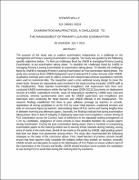Examination Malpractices: A Challenge to the Management of Primary Leaving Examination in Uganda July 2016.
Abstract
The purpose of the study was to explore examination malpractices as a challenge to the management of Primary Leaving Examination in Uganda. The study was guided by the following specific objectives below: To find out challenges faced by UNEB in managing Primary Leaving Examination at pre-examination taking phase, To establish the challenges faced by UNEB in managing Primary Leaving Examination at examination taking phase, To identify the challenges faced by UNEB in managing Primary Leaving Examination at Post examination taking phase. The study was carried out from UNEB headquarters and 10 selected PLE center Schools under UNEB. Qualitative methods were used to collect, present and interpret data whereas quantitative methods were used on numerical data. The researcher used a cross sectional survey design to cover the entire study. Seventy six respondents were involved in the study and they included: UNEB staff at the Headquarters, Head teachers Examination Invigilators and Supervisors who have ever conducted UNEB examinations within the last five years (2009-2013).Documents on deployment records of UNEB, expenditure records, cases of malpractices handled by UNEB were read and scrutinized, whereas questionnaires were used for UNEB supervisors and invigilators and interviews were conducted for Head teachers and UNEB officials at the Headquarters. The research findings established that there is poor syllabus coverage by teachers in schools, registration of wrong candidates to sit for PLE by some Head teachers, unplanned revision and tests on uncovered topics by teachers, deteriorating status of PLE centres and having lengthy time in between morning and afternoon papers. Secondly, the findings indicate that during examination taking phase, there is lack of integrity in deploying supervisors and invigilators, uneven timing of PLE examination across the Country, lack of adherence to the stipulated seating arrangement of 1.2m by candidates, negligence of some schools to have lockable facilities for unused papers during examination .During the post examination taking phase, there is hardship in transporting examination papers to the marking centres due to security threat, biasness during marking, wrong entry of marks in the mark sheet, denial of raw marks to the public by UNEB, rigid grading system that does not depict true assessment among others. The study also recommended the following strategies on the basis of the conclusion above: First, Head teachers of primary schools should ensure that their teachers fully complete the syllabus before they embark on revision, secondly UNEB should use helicopters to assist in the distribution of PLE Papers to ensure uniform start of the examination in the Country and finally, UNEB should introduce secret numbers for candidates to use during PLE to avoid bias during the marking time by examiners.
Collections
- Thesis and Dissertations [209]

